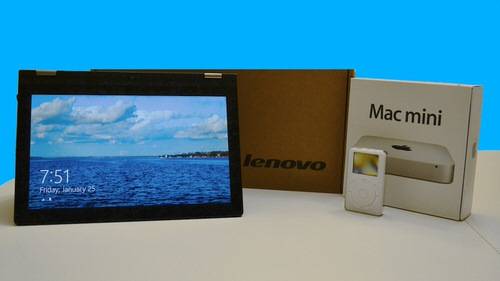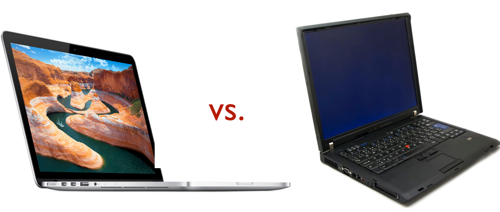
One company started in a garage. The other started in a guard shack in China with $25,000, according to The Economist.
The first company took “Computer” out of its name on January 9, 2007. The other is now the leading seller of PCs in the world, by some measures at least.
Who Owns The Computer Market?
We all know that Apple is still a money machine – and the best in the world at it. But observers like Dan Frommer are now predicting that “Mac shipments… seem to have peaked for good.” That is a stinging comment.
Lenovo, meanwhile, might be the best in the world at making computers – at least the desktop and laptop versions.
So where will these two behemoths end up over the next few years?

Opposing Approaches
Tom Peters’ seminal book, In Search of Excellence, listed eight themes that defined the success of the corporations. One rule was “Stick to the knitting – stay with the business that you know.”
Apple might have rewritten that rule. While there have been questions about the research behind Peters’ book, there are few about Apple’s success through creating and mastering new lines of business. The iPod, iPhone and iPad are powerful examples of how a company can define its own future by strking out in new directions.
Still, it is very interesting to speculate on which company’s strategy will win in the end. The question draws me back to my days at Apple – when I watched the company set off in the directions that now define it.
What might surprise some people is that the decisions that Apple made were often not conscious ones. They sometimes just happened in Apple’s unique corporate culture.
I have described trying to manage at Apple as trying to herd a bunch of cats over a wall with a pitchfork. To complete the image, there was one person whose voice would send the all the cats over the wall instantly. That person, of course, was the late Steve Jobs.
Different Paths To Different Places
Let me try to shed a little light on why Apple and Lenovo are fundamentally different.
The first difference is Lenovo’s strategy of making sure there is place to buy one of its computer very close to where the consumers are. Even in an emerging market like China, Lenovo’s goal is to be within 30 miles of every consumer.
Apple, meanwhile, got to what I like to call its “metropolitan strategy” through a combination of missteps and vision.
In the early ’90s, Apple wanted to strengthen its sales presence in the K-12 education market. Instead of hiring more people, it chose to strengthen the agent model by reducing the number of resellers who could be educations agents. As a manager in Apple’s Education division, I had to make some very difficult calls to small rural dealerships and tell them Apple was changing their contract so that they could no longer sell to education customers. For some of these small resellers, losing Apple’s education business was a death knell.
That was a misstep.
The vision part came in when Apple figured out that its now-weakened resellers would never do as good a job as Apple-branded stores could. That was the genesis of the fabulously successful Apple Stores.
Not everything has changed. Apple has a history of disappointing its partners. Former and current Apple resellers have endless stories of Apple not letting them sell iPods to predatory specials at Apple Stores to chronic availability problems on hot products.
For its part, Lenovo has exclusive resellers in China and exclusive territories in India. Both setups are very different than the retail situation in the United States – but they’ve played a big part in Lenovo’s growth and are now actually targets for Apple.
The Business Market
Another huge difference is Lenovo’s focus on corporate PC sales. Lenovo has doubled its success in that market, according to The Economist.
At one point, I actually led Apple’s most successful enterprise sales team. We tripled Apple’s sales into arguably the most Windows-centric market in the world, the United States government. But our tiny team were fish swimming against the tide in a company rapidly transforming itself into a consumer powerhouse.
Price Matters
Here’s one final point. Apple has come to believe it cannot make anything worthy of the Apple brand at a low price point. Lenovo believes it can deliver quality and still serve customers looking for a good deal.
If they are both right, that’s a big win for Lenovo.

















